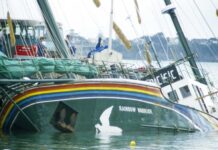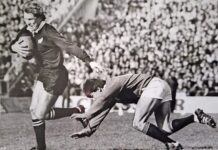
Fears have surfaced that Segway tours at Blackpool Beach could disturb rare native godwits and dotterels.
Island conservationist Sue Fitchett says groups riding the two-wheeled electric vehicles should not be whizzing into the habitat of rare New Zealand dotterels and bar-tailed godwits at the western end of the beach.
However, SegWai owner and director Andrew Lanyon says the tour groups travel at less than 15 km/hr and do far less damage than horses and cars, which also ride on the beach.
Sue is calling on Auckland Council to carry out an ecological assessment of the impact of the Segways on the godwits, which have a conservation status of declining, and the dotterels, which are nationally vulnerable.
Given that native seabirds are already struggling to survive, Waiheke Native Bird Rescue founder Karen Saunders says the SegWai tours near Piritahi Marae are “sad and really unnecessary”.
“The birds have got so much against them – about 90 per cent of native seabirds and shorebirds are threatened with extinction and we don’t respect that, really.
“To have these tours on top of it in their environment is really, really sad,” says Karen.
About 90 per cent of the seabirds she has looked after since starting the volunteer bird rescue service in July last year have been suffering from malnutrition, possibly caused by overfishing, and few have survived.
SegWai has been taking guided tours for groups of up to six people for just over a year.
Tours run from Matiatia through Te Atawhai Whenua Reserve to Cable Bay and Mudbrick vineyards, before heading to Oneroa and Blackpool Beach, where riders can look at the marae and the old shipwrecked scow, Rahiri, then head to Surfdale Beach.
Another tour starts at Owhanake Bay and explores remote Island Bay, before riders head to Oneroa.
Andrew says that before launching he discussed the venture with the council, the police and marae representatives, but no permits were needed.
The tours include information on the endangered native birds at Blackpool. “We try to stay away from the godwits and dotterels, so they can have a bit of a rest.
“We tried to work out a place that was equally beautiful and entertaining and respectful of locals and the island and the animals that are here.
“It gets people off taxis and buses and experiencing the beauty of the island.”
Andrew describes the concerns about tours disturbing the birds as “completely unfounded and unfair”.
“There are other things going on that are far more disruptive.” • Rose Davis






